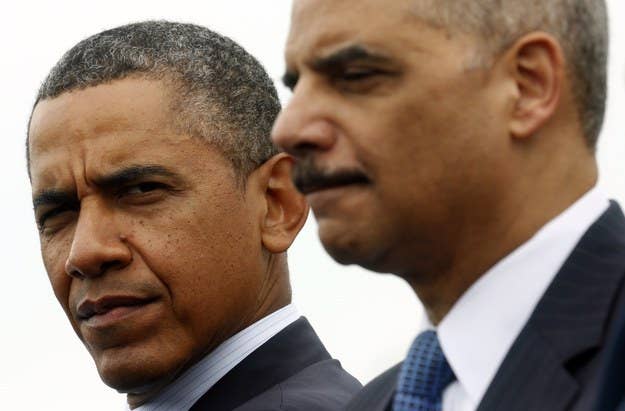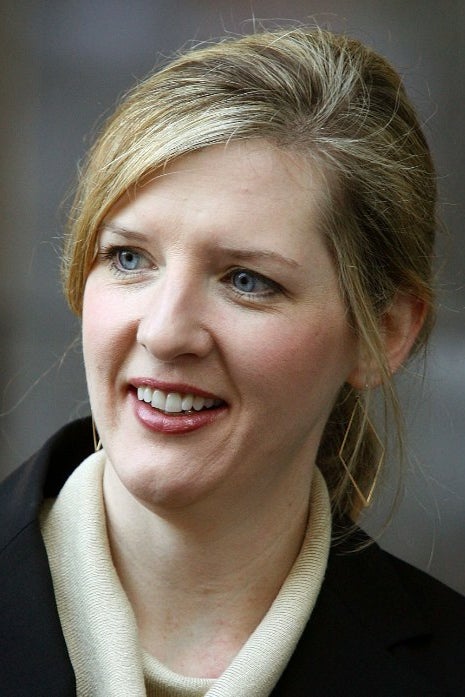
WASHINGTON — Progressives have some advice for President Obama as he prepares to choose the nation's next attorney general: Don't change anything.
In interviews with about a dozen major progressive legal advocates, including some who have clashed repeatedly with the administration, almost all said they wanted the Justice Department to look the same as it does today after the exit of current Attorney General Eric Holder. There's a belief among many on the left that the department — already arguably the most liberal part of Obama's administration — has taken steps in the second term to align the Justice Department even more closely with progressives' aim.
With the next attorney general, in other words, the left's main goal is seeing that the trajectory Holder has set continues.
Representing a broad swath of causes from opposition to restrictive voting laws to those pushing for the expansion of LGBT rights, the only real area any advocates flagged for improvement was in the area of civil liberties, particularly in relation to terrorism issues.
Even Floyd Abrams, the First Amendment attorney who has fought the administration in court on multiple occasions over its extraordinary war on leaks, said he doesn't want to see significant changes to the Justice Department after Holder's gone.
"There's good reason for hope that whether or not Attorney General Holder remains in office for the totality of the remaining years of President Obama's tenure that things will cool off a bit and there will be greater attention paid to avoiding conflict between the administration and the press," Abrams said.
He said that the latter years of Holder's term as attorney general were notable for a change in tone when it comes to the press. Abrams thinks that change was significant — and that reporters battling the Obama administration to protect their sources will face a better situation going forward.
"I think that's true even if he stays," Abrams said of Holder. "I think he has made a number of statements that indicate a desire to seek some sort of reconciliation with the press and I think he would take great care in provoking new conflict with the press."
For advocates who haven't fought as hard with Holder as Abrams has, there's even less of an incentive to see any drastic changes at the Justice Department after he leaves.
Last week, Obama signaled he too wants to keep the status quo at the Justice Department when it was reported that he would be nominating longtime progressive activist Vanita Gupta to head the Justice Department's Civil Rights Division.
What her nomination means, however, depends on who Obama picks to lead the Justice Department. Obama's reported short list of Holder replacements includes Kathy Ruemmler, Obama's former White House counsel and a close personal ally, but an option who lacks a strong background in the progressive legal community. On the other end of the short list spectrum is a name that Latino advocates and other progressive groups have rallied around as their pick: Labor Secretary Tom Perez.
Many of the progressive advocates steered clear of naming names when asked who they want to see be the next attorney general. But Perez worked under Holder and helped spearhead many of the Justice Department pushes of which progressives are most proud. The big question going forward: Was Gupta a peace offering to the left before more White House-allied nominee is announced, or was her selection a sign that Obama wants to heed the left's call for a new Justice Department that looks pretty much like the current one and will continue to press progressive causes?
Leaders from organizations across the progressive spectrum who spoke with BuzzFeed News pointed to the importance of the Justice Department's work on voting issues — specifically, joining in court challenges to states making changes to voting laws — as critical.
"I think whoever the next attorney general is will have to share Attorney General Holder's understanding that the right to vote is fundamental," said Caroline Fredrickson, the president of progressive legal group the American Constitution Society. "And it is not only the appropriate role but an absolutely necessary role for the Department of Justice to be fully engaged in protecting that right.
Fredrickson called Holder's voting rights work "very consequential" — and also praised the selection of Gupta this past week, and said she believes Gupta will bring "devotion" to voting issues.
The admiration for Holder among progressives on voting issues is real. Michele Jawando, Center for American Progress' Legal Progress vice president, called Holder an "icon for so many in the progressive community" and highlighted in particular his work on voting. Specifically, she praised the work of the department in the wake of the Supreme Court's 2013 decision in the Shelby County case that effectively gutted Section 5 of the Voting Rights Act, which required advance clearance from the department before several places in the country could make changes to their voting laws.
"As you continue the last two years of the Obama administration," Jawando said, "the work that the Justice Department will do will have an impact that will remain beyond the remaining time of the administration. We definitely would want someone who can speak to his work in voting rights, curbing racial profiling — that's also been something that he's really been engaged in — and hate crimes prosecutions."


To that end, NAACP Legal Defense Fund President Sherrilyn Ifill said the next attorney general needs to carry on the civil rights projects Holder began. "It's a big job and it's a big job in large part because of the standard Attorney General Holder has set in the civil rights realm and voting rights and criminal justice," she said. "And so he will be leaving behind a pretty big portfolio that will need leadership in order to produce the results and to steward it to the conclusion that I think he would want."
Ifill said that, for the NAACP Legal Defense Fund, the next Attorney General must continue Holder's efforts around voting rights, criminal justice efforts, and "policing in general." Holder pushed the Justice Department to investigate police activity surrounding several high-profile police shootings of black men, including most recently the death of Michael Brown in Ferguson, Missouri. Those efforts really just got underway in the weeks before Holder announced his resignation, Ifill noted, meaning much of the work is left to whomever takes Holder's place.
"There has been, particularly the last two years, this increased focus on reforms in the criminal justice space, and I would love to see a continued focus on [that]," Jawando said. "You are now seeing this aligning of both Republican and Democratic interests on this issue, and I think that that's powerful."
The increasingly bipartisan push for changes to the way the drug war is fought in America — including a push to end mandatory minimum sentences, lowering the criminal penalties for crack cocaine crimes closer to those for powder cocaine crimes, and tilting prosecutors away from the heaviest penalties — has been a signature achievement for Holder's Justice Department and another area where Gupta's move could be key in the final two years of the Obama administration.
"We'll be watching the nomination and confirmation process with interest," said Mike Riggs, spokesperson for Families Against Mandatory Minimums. "It is our hope that the next attorney general will work with Congress and the U.S. Sentencing Commission to address overcrowding in the federal prison system, which is currently at 136% capacity and consuming 25% of [the Justice Department's] budget."
Continuing Holder's work on the drug war front is "the biggest thing DOJ could do" in the last two years of the Obama administration, said Rob Smith, a law professor at the University of North Carolina School of Law.
"The [Justice Department] is a uniquely situated place to effect how the laws are policed on the front end," Smith said, pointing to racial bias in policing grant programs that provide weapons to police departments and incentive programs for changing police policies as areas for a more progressive, proactive change.
Similarly, a number of advocates emphasized the importance of "access to justice" — or improved legal assistance.
"The new attorney general should make this a real commitment because it's one of those initiatives that, if it doesn't have leadership commitment, it will grind to a halt by itself," said Bert Bradenburg, the executive director at Justice at Stake who also served as the chief spokesman for President Bill Clinton's attorney general, Janet Reno. "It has to have leadership as its fuel."
The American Constitution Society's Fredrickson echoed the concern, noting that Holder "has emphasized rights of criminal defendants in a way that is rare for prosecutors. … [H]e has really tried to bring about a sea change in the way the Justice Department views their role in terms of how cases play out — and recognizing that they have a broader role than simply trying to lock people up."
But, of course, there's one area where progressives — and others — have really clashed with the administration: national security and espionage issues. In the interviews, the only real criticism of Holder among progressives centered around these issues.
"I really think it's a very important pick, and I think the national security issues — especially in light of the [Edward] Snowden disclosures — deserve a substantial revisiting," said Laura Murphy, the director of the American Civil Liberties Union's Washington Legislative Office.
The ACLU's hope, she said, is that the next attorney general will "revisit" the deference the Justice Department has given to the intelligence community, from prosecuting whistleblowers under the Espionage Act to refusing to release the complete Office of Legal Counsel memos on the targeted killing program to closing Guantanamo. (Murphy had praise for Holder, too, regarding the Voting Rights Act and giving a new look at the war on drugs.)
Asked if the Justice Department revisiting those issues was a pipe dream or a legitimate possibility, Murphy said, "I don't think it's a complete pipe dream, because I do think it's a legacy issue for this president. I don't think it's a pipe dream to meet with a new attorney general and continue to ask for what we want."
As progressives — and the country — await news of who Obama will nominate to take Holder's place, CAP's Jawando summed up the general, though not unanimous, view from the left: "Whoever takes the mantle has huge shoes to fill — but, I believe, can take things a step in the right direction."

